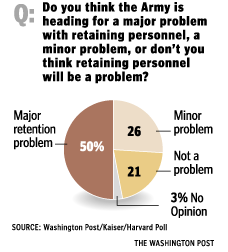Army Personnel Crisis Looming
From the front page of tomorrow’s WaPo: Personnel Crisis Looming, Army Spouses Say
The extended, or repeated, deployments that characterize the post-9/11 Army have intensified the burdens traditionally borne by military families. And most of the spouses who have remained behind are wondering how long the Army can keep it up.
This change is reflected in a recent poll conducted by The Washington Post, the Henry J. Kaiser Family Foundation and Harvard University, and in dozens of supplemental interviews. The poll, the first nongovernmental survey of military spouses conducted after the terrorist attacks of Sept. 11, 2001, included more than 1,000 spouses living on or near the 10 heaviest-deploying Army bases.
While most of them said they have coped well, three-quarters said they believed that the Army may hit a personnel crisis as soldiers and their families tire of the pace and leave for civilian lives.
Lt. Gen. Franklin “Buster” Hagenbeck, the Army’s personnel chief, said in an interview that overall, The Post/Kaiser/Harvard poll results seemed to reflect those of the service’s internal surveys.
The findings come at a time when the Army is providing soldiers’ families with unprecedented levels of support. Over the past 30 years, beginning with the end of conscription after the Vietnam War, the service became smaller, more professional — and more married. By the 1991 Persian Gulf War, the military was caught flat-footed by the growing need to support soldiers’ families during a major deployment.
In response, the Army built a robust network of family supports ranging from day care to counseling to legal help to instruction in Army basics, household finance and coping with stress. In addition, spouses can volunteer together and watch over one another through Army Family Readiness Groups.

Worrisome indeed. While it’s true that this deployment level is hardly unprecedented, the circumstances have changed. Historically, soldiers were deployed all the time. But most soldiers either remained unmarried or had wives that simply accepted the situation as their lot in life. In an era where wives tend to have careers of their own, and thus don’t have the free time to manage the household on their own, this level of opstempo is unsustainable. And, surely, it’s not going to get better any time soon.
Hagenbeck said the Army is taking family concerns over deployments into account. “We recognize that as a major issue,” he said. Yet in the war on terrorism, the Army is becoming increasingly expeditionary — that is, based in the United States but prepared to take on a stream of new missions overseas. “That’s the business we’re going to be in for a while,” said Col. Michael Resty, the garrison commander at Fort Carson, Colo. “Anybody who thinks differently is fooling themselves.”
The strain on troops and their families has led some in Congress to advocate a big boost in the size of the active-duty Army, which stands at about 485,000 troops.
The Pentagon is planning to add 30,000 soldiers over the next several years, but before agreeing to further expansion, it wants to see whether the other steps it is taking will ease the strain. Most notably, the Pentagon is reorganizing divisions to expand the number of the Army’s deployable brigades from 33 to 48. In addition, the Army has announced a new policy under which troops will serve longer tours at bases, permitting their families to put down deeper roots.
The question is whether those steps will be sufficient. “There’s no way to know for sure,” said Tom Donnelly, a former staff member of the House Armed Services Committee. Donnelly said he expects that 2005 will be “the make-or-break year,” as some soldiers who have already served in Iraq for a year are sent back for a second tour.
In the meantime, repeated and unpredictable deployments remain Army spouses’ biggest issue. In The Post/Kaiser/Harvard poll, a slight majority — 55 percent — said their spouses’ current deployment had been extended longer than they expected. Of that group, more than a third said that had created “major problems” for them.






From the front page of tomorrow’s WaPo
Can you get me the lotto number too?
Seems like only yesterday the party line was “come on in, the water’s fine” and there was no recruitment/retaining problem.
—